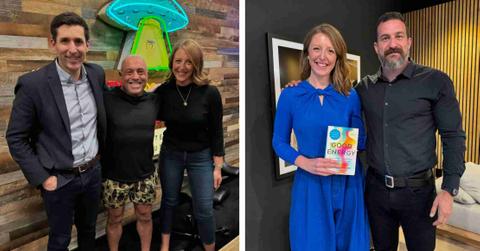Is Casey Means a Doctor? Details on the Alleged Grifter and Surgeon General Nominee
Your views on Dr. Means are likely influenced by party affiliation.
Published May 8 2025, 1:39 p.m. ET

It should come as no surprise that many individuals holding prominent positions appointed by the Trump Administration hold controversial nutritional views, often unethical positions on human health, and generally have questionable backgrounds. Nevertheless, wealthy individuals continue to hold considerable power within the U.S. government, lack of requisite credentials be darned.
All of that said, is Casey Means, President Donald Trump's surgeon general nominee, a medical doctor?
Here's what you should know about the controversial nomination of Casey Means, why critics have lambasted the move, and how the future of U.S. public health guidance may be influenced by Means's views. Keep reading below to better understand Means's background, education credentials, and why her nomination has some critics concerned.
Is Casey Means a doctor?
Yes, Casey Means is a medical doctor. Dr. Means earned her Doctor of Medicine degree at Stanford in 2014 and, as The New York Times reports, has since openly criticized the influence that corporations hold over the collective health of patients traversing the U.S. healthcare system.
Though Dr. Means was educated and trained at a prominent institution like Stanford, that doesn't mean her background is without controversy and questionable decisions.
"Dr. Means, who trained as an otolaryngologist and head and neck surgeon, left surgery behind without finishing her training to practice so-called functional medicine, which focuses on addressing the root causes of disease," according to The New York Times. "She published a diet and self-help book last year titled Good Energy: The Surprising Connection Between Metabolism and Limitless Health.”
In the May 7 edition of her Good Energy newsletter, Dr. Means made her stance known on vaccines, as well. On the topic of the National Childhood Vaccine Injury Act of 1986, Dr. Means wrote that there should be an "increase [in] unbiased research on the safety of the cumulative effects of vaccines on the CDC vaccine schedule."
Dr. Means also believes that "There is growing evidence that the total burden of the...growing vaccine schedule is causing health declines in vulnerable children."
Although Dr. Means seeks to break up meat industry monopolies, her views on this particular issue have more to do with a pro-American stance than an "eat a plant-based diet" approach.
"85% of the meatpacking industry is owned by four companies, three of which are located in Brazil or China and have a long history of abuses and fraud," she wrote. "There is a huge burden to small farmers due to overregulation and centralization that hurts American freedom to buy local and sustainably-grown foods."
Is medical school a requirement for Trump's surgeon general pick?
According to MSNBC, President Trump initially disclosed his preference for Fox News contributor Dr. Janette Nesheiwat to be the pick, but over time, the pressure of Trump's preference has instead fallen on Dr. Means.
Per the Independent, Trump has said that Dr. Means “has impeccable ‘MAHA’ credentials,” and has been a close ally of Robert F. Kennedy, Jr., the Secretary of the U.S. Department of Health and Human Services (HHS) who oversaw mass layoffs as well as other sweeping changes.
It helps, of course, to have close friends and family in high places. As the Independent notes, "her brother Calley, [is] a former food industry lobbyist who now serves as a White House health adviser," who co-authored Good Energy with her.
All of that said, according to the HHS website, the surgeon general is "the nation's doctor." Given the lack of credentials of RFK Jr. as the head of HHS, though, anything truly is possible.
